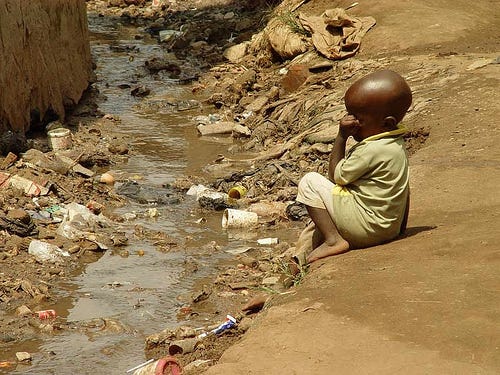
I love gardening and the soil on which gardens sits, even though I no longer have a garden. My favourite quote about the beautiful soil and gardening is from Wangari Maathai (1940–2011) — bless her heart whenever she may in the world yonder.
Maathai once said: “We think that diamonds are very important, gold is very important, all these minerals are very important. We call them precious minerals, but they are all forms of the soil. But that part of this mineral that is on top, like it is the skin of the earth, that is the most precious of the commons.”
Wonderful!
Now look at the first families of Rwanda and Uganda enjoying the beautiful soil and the wonderful green garden on top. They are on top of the world.
But there is a bit of a problem in the two homelands led by leaders Yoweri Kaguta Museveni, and Paul Kagame.
Their capital cities are quite literally sinking in shit.

So how are the two leaders addressing this urgent matter? They are begging money from donors. Bill and Melinda Gates Foundation and UK’s Department for International Development (DFID) have come to Museveni’s rescue. Their project is to collect, transport, treat, and dispose of faecal sludge from pit latrines and septic tanks of Kampala.
Kagame is still struggling. The European Investment Bank (EIB) gave him money to do a feasibility study. But Kagame has yet to find donors to give the cash to fix the smelly matter. While he touts his Kigali City as Africa’s cleanest, it is actually the dirtiest underneath — and the smelliest, too. Avoid passing by the 1930 Prison and Nyamirambo after the rains. If you know what I mean.
In Kinyarwanda we have a proverb that says — “Akabi gasekwa nkakeza.” That the bad sometimes provokes laughter as much as the good. Indeed. We can all have a good laugh at the smelling capitals of our homehands.
But this is hardly a laughing matter. According to the World Bank, 2.5 billion people worldwide lack adequate sanitation. Shockingly, 1 billion still practice open defecation. The World Bank says that lack of toilets globally results in an astonishing cost of USD 260 billion annually in health and societal impacts. And guess what? Sub-Saharan Africa leads the way in this nightmare.
My unsolicited advice to Museveni and Kagame is this — now that you have extended your power, please address this smelly issue from your own budgets. It is embarrassing that donors have to do this for you. Surely!
By David Himbara
David Himbara is an educator, political economist, and author based in Toronto, Canada. He teaches and works in the field of development and competitiveness.

